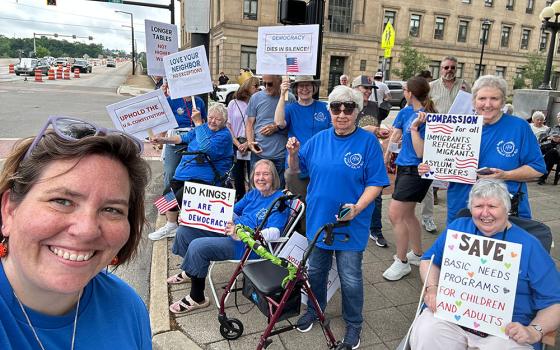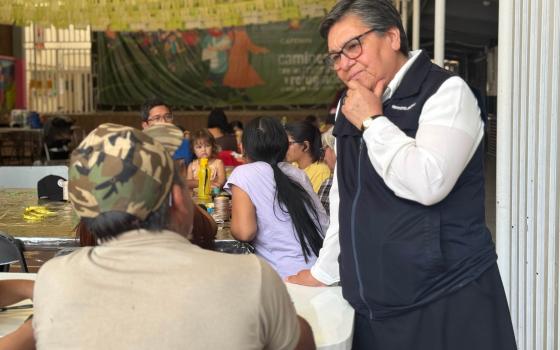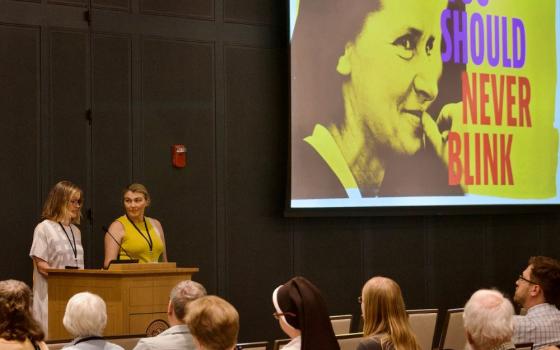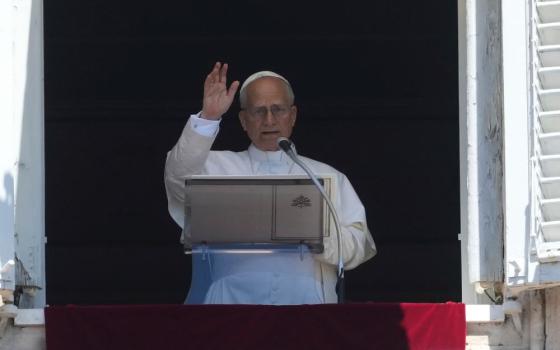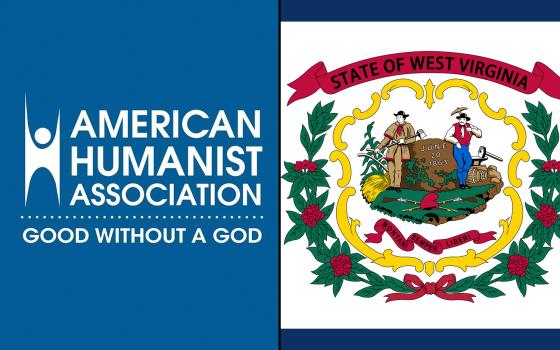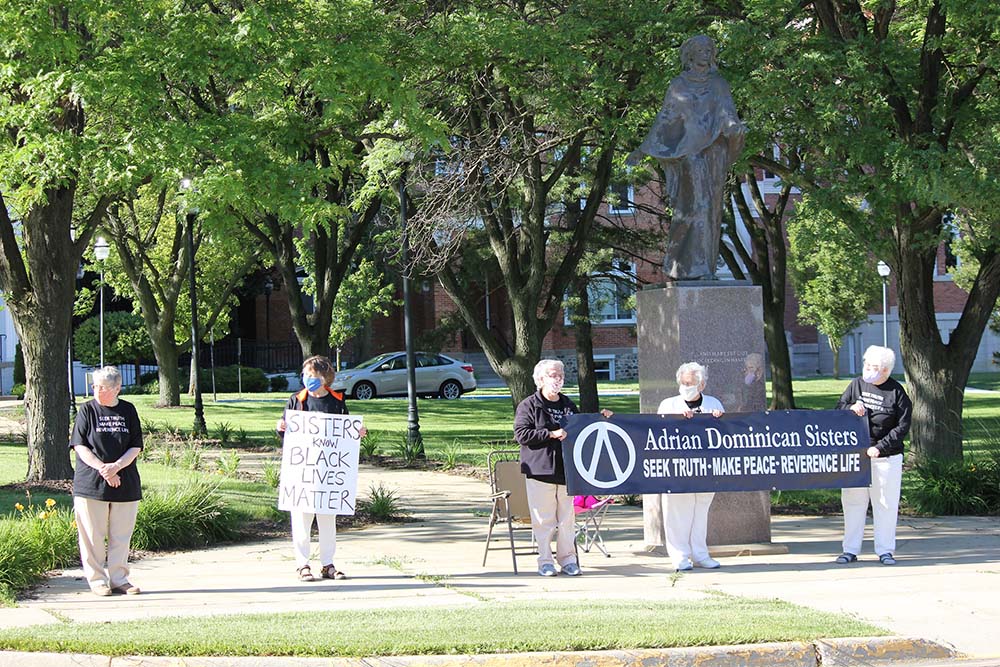
While COVID-19 safety protocols prevented them from participating in a June 2020 Black Lives Matter march, members of the Adrian Dominican Sisters' general council and other sisters showed their support of the march as it passed in front of the motherhouse in Adrian, Michigan. The archivist for the Adrian Dominicans has preserved photos of the Black Lives Matter protests as well as the community's social justice statements made during the COVID-19 pandemic. (Courtesy of the Adrian Dominican Sisters)
When the COVID-19 pandemic began in March 2020, historians and journalists scoured documents for information on the World War I-era disaster that was dubbed the Spanish flu of 1918-19, seeing it as the closest historical parallel to the new lockdowns and hundreds of thousands of deaths.
They discovered a research gold mine in Philadelphia. There remained a treasure trove of information, meticulously gathered, detailing how sisters took up the challenge of caring for the sick. Many were young and inexperienced, often forced out of classrooms to take on nursing care, fill slots in hospitals and walk the streets, knocking on doors to check on the homebound ill.
But for other cities, researchers found little, a precedent modern archivists hope to avoid when recording the impact of the past year on religious communities.
Margaret McGuinness, a professor at La Salle University in Philadelphia who has written extensively on the histories of religious congregations, said the process of creating an archive is complicated, as historians often have to pull together piecemeal documentation on great events.
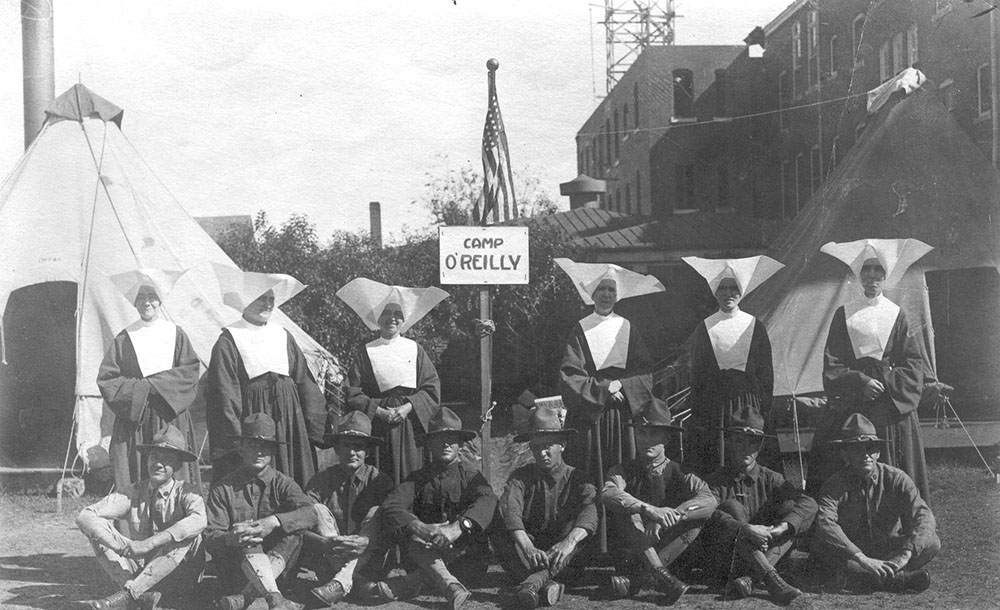
Daughters of Charity at Camp O'Reilly, the "tent city" camp at Seton Hospital in Austin, Texas, in 1918, during the Spanish flu epidemic (Courtesy of the Daughters of Charity, Province of St. Louise)
Even though the ability to store data has increased markedly since the Spanish flu pandemic, McGuinness said there are extensive challenges in preserving the records of the current pandemic. Historians rely on written documents, including formal records of meetings or journal entries scribbled by a sister toiling in a hospital overwhelmed by human suffering.
"People don't write letters [now]. They send emails," McGuinness said. Emails eventually get purged or are impossible to archive without devoting extensive resources to retrieve them.
Assisting the process of recovering information is the Archival Resources for Catholic Collections, formed after a July 2018 Boston College conference on Catholic religious archives. The group encourages religious communities, particularly those who face possible completion, to preserve their histories.
Malachy McCarthy, archivist for the Claretian Missionaries and coordinator of the Chicago-based archival resources group, said the group is offering tools for religious communities to find solutions to their archival issues. A November 2020 webinar brought together 300 participants who gathered to solve history-keeping issues, such as keeping a record of the work of religious congregations available to future generations. Another webinar was scheduled for May 6.
He credits the group with inspiring Boston College to open a Catholic Religious Archives Repository, and a similar effort is underway at the Heritage and Research Center at St. Mary's College in Indiana. A group of communities in Cleveland have begun discussions on creating a collaborative effort for sisters' congregations in their region.
"ARCC is only a year old, and we have accomplished a great deal," McCarthy said. "Since it is a volunteer organization, the efforts are being undertaken by individuals who are passionate about saving these valuable collections."
Meanwhile, archivists of religious congregations are diligently building a record about the impact of COVID-19.
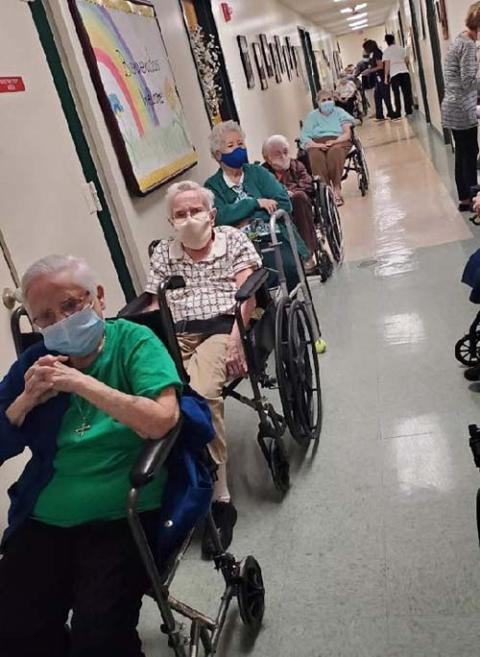
Sisters of St. Dominic of Amityville, New York, wait for their first dose of the COVID-19 vaccine Jan. 15 at the motherhouse. (Courtesy of the Amityville Dominicans)
Virginia Dowd, archivist for the Sisters of St. Joseph of Brentwood, New York, said she was disappointed when she began looking at how the community coped with the 1918 pandemic.
"I am scrounging to piece together that story. Almost nothing was written up," she said.
Dowd is determined to keep a permanent record for the COVID-19 pandemic. She asked sisters, including those homebound at the congregation's massive motherhouse on Long Island, to mark their observations. This also includes sisters active in ministries, such as Sr. Kathy Hickey, who recorded her observations about her experiences during the early stages of the pandemic while working at a food pantry in Queens.
Dowd keeps a permanent record of submitted reflections, with old-fashioned paper files as well as digital collections. She has received 35 reflections from sisters and is seeking more.
Lisa Schell, archivist for the Adrian Dominican Sisters in Michigan, said she has tried to capture pandemic events as they happened. The congregation has been hit hard by COVID-19, losing 13 sisters in early 2021.
Schell has preserved the livestreamed videos of funeral services, as well as photos and texts that ran with the sisters' obituaries. She has also chronicled an extensive volume of congregational statements on social justice issues, such as the Black Lives Matter protests that occurred last summer.
"I look to past research requests to help inform what I should be keeping," Schell said. "Anything related to social justice issues are the key to predicting what scholars in the future will want to research."
Sr. Margaret Kavanagh, archivist for the Sisters of St. Dominic of Amityville, New York, has gathered written reflections from sisters, and the community's communications office is preserving livestreamed liturgies and a closed-circuit television daily prayer service. About two dozen sisters offered reflections, and Kavanagh wants to encourage more.
Advertisement
"Never has so much changed so quickly in 82 years of life!" one sister noted in a 2020 reflection. "Sixty-four years of religious life was more or less very predictable, very routine until March when isolation hit. ... The telephone became a tool for a new ministry of checking in on those housebound. An old form of communication was resurrected — letter writing, using a pen and paper to connect with others. Lessons in piano were given over the telephone."
Another sister saw the pandemic response's brighter side: "I have been able to take time to appreciate God's beautiful world ... to watch as spring has arrived and to delight in the songs of the birds. In many ways this time has been a gift, a time to take stock of one's self and to make resolutions for the future."
Scott Keefer, archivist for the Daughters of Charity Province of St. Louise in Emmitsburg, Maryland, is saving episodes of an official podcast, "In the Company of Charity," hosted by Srs. Elizabeth Greim and Liz Sjoberg. The podcast features discussions of spirituality and the works of the Daughters.
It's important, Keefer said, to make a conscious effort to save such materials.
"Although it appears these types of new digital media will be available online forever, they can be taken down by their creators at any time, and unless someone takes steps to keep the files safe, they are at high risk of being lost," he said.
Sr. Helen Jacobson, archivist for the Sisters of St. Francis of Philadelphia, has been collecting newspaper accounts and reflections shared on the community's website. Chronicled have been accounts of long-term isolation, the impact of school closings and the lack of in-person communal prayer life, especially in Lent and at Easter.
Yet she is not satisfied with what she has been able to gather.
"It's incomplete, especially in light of what was collected for the 1918 flu epidemic," Jacobson said.
One large impact of the COVID-19 pandemic on sisters' congregations are what sisters were prevented from doing; in particular, gathering for community liturgies, she said.
"It has been a terrible hardship," she said, noting that the community has gathered regularly since its founding in 1855. "We have never not had communal prayer, and it has been especially disheartening for major feasts and celebrations."
She said she sees a major difference between the role of sisters in 1918 and the current pandemic.
"Back in 1918, our sisters were young," she said. "We are not in that position."
McGuinness said not only are the members of religious congregations aging, but some communities are not expected to survive beyond a few more decades. Many congregations have few resources to record their history and, as numbers dwindle, few members to keep alive an institutional memory.
Sr. Angela Ann Zukowski, a professor of religious studies at the University of Dayton and archivist for the Mission Helpers of the Sacred Heart, her religious community, is maintaining documentation of meetings and personal reflections of sisters during the pandemic with an eye on an uncertain future. The Mission Helpers have a total of 35 sisters, most of whom have aged out of active ministry.
"I am suggesting to our sisters we have to write down our life experience," she said, noting that the history of the community is even more important to preserve as their numbers diminish.
Few congregations now maintain annals of convent life, so a prime record of day-to-day events may well disappear.
Another issue is psychological. Many sisters don't see what they do as memorable or historic, so material is lost in the process, McGuinness said. She said it's up to congregations to encourage saving documents, whether paper or digital, so that a complete history can be put together about how sisters survived the COVID-19 pandemic.
"There are going to be really important questions that people are going to want to look at," she said.

